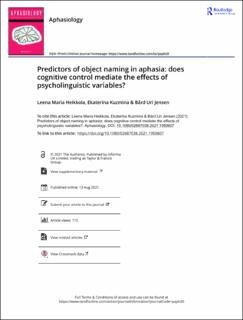| dc.contributor.author | Heikkola, Leena Maria | |
| dc.contributor.author | Kuzmina, Ekaterina | |
| dc.contributor.author | Jensen, Bård Uri | |
| dc.date.accessioned | 2022-02-14T11:32:22Z | |
| dc.date.available | 2022-02-14T11:32:22Z | |
| dc.date.created | 2021-08-16T15:45:45Z | |
| dc.date.issued | 2021 | |
| dc.identifier.citation | Aphasiology. 2021, . | en_US |
| dc.identifier.issn | 0268-7038 | |
| dc.identifier.uri | https://hdl.handle.net/11250/2978730 | |
| dc.description | © 2021 The Author(s). Published by Informa UK Limited, trading as Taylor & Francis Group. | en_US |
| dc.description.abstract | Background and Aims Previous studies have shown that age of acquisition affects language production in persons with aphasia (PWA), specifically, earlier-acquired words are better preserved compared to later-learned ones (for review, see Brysbaert & Ellis, 2016). Also, it has been argued that naming objects with lower name agreement requires inhibition of alternative names (Alario et al., 2004), and therefore puts higher demands on cognitive control. Bose and Schafer (2017) showed that although both PWA and healthy controls performed better at naming words with high naming agreement, the difference between the naming conditions was significantly greater for PWA. This could be due to reduced ability to inhibit irrelevant information in PWA. The current study aims to investigate whether cognitive control mediates the effects of psycholinguistic variables on object naming accuracy in aphasia. Methods and Procedures Participants (N = 31, 32% female) were right-handed, native Russian speakers with preserved visual and hearing abilities diagnosed with mild to moderate post-stroke aphasia. They were aged 40–70 (mean = 59.5, SD = 8.6). The participants were tested on a picture-naming task including 247 items and 2 subtests from the Russian Birmingham Cognitive Screen, namely Auditory attention, and Rule Finding tasks. Outcomes and Results To define whether cognitive control mediates the effect of psycholinguistic variables on naming response accuracy, multiple linear regression was used. Significant main effects of log-transformed word frequency, AoA, and cognitive control were found, as well as a significant interaction between log-transformed word frequency and cognitive control. Conclusions Our findings suggest that cognitive control mediated the effect of word frequency in naming in aphasia. PWA with weaker cognitive control name pictures depicting less-frequent words less accurately than more frequent words. This points to the fact that PWA have difficulty in lexical access when producing language. The implications of the study are that the focus of aphasia rehabilitation should be on very frequent structures and words as these are usually more preserved in PWA with weaker cognitive control. | en_US |
| dc.language.iso | eng | en_US |
| dc.rights | Attribution-NonCommercial-NoDerivatives 4.0 Internasjonal | * |
| dc.rights.uri | http://creativecommons.org/licenses/by-nc-nd/4.0/deed.no | * |
| dc.subject | Afasi | en_US |
| dc.subject | Aphasia | en_US |
| dc.subject | naming | en_US |
| dc.subject | cognitive control | en_US |
| dc.subject | psycholinguistic variables | en_US |
| dc.title | Predictors of object naming in aphasia: does cognitive control mediate the effects of psycholinguistic variables? | en_US |
| dc.type | Peer reviewed | en_US |
| dc.type | Journal article | en_US |
| dc.description.version | publishedVersion | en_US |
| dc.subject.nsi | VDP::Anvendt språkvitenskap: 012 | en_US |
| dc.subject.nsi | VDP::Applied linguistics: 012 | en_US |
| dc.source.pagenumber | 19 | en_US |
| dc.source.journal | Aphasiology | en_US |
| dc.identifier.doi | https://doi.org/10.1080/02687038.2021.1950607 | |
| dc.identifier.cristin | 1926416 | |
| cristin.ispublished | true | |
| cristin.fulltext | original | |
| cristin.qualitycode | 1 | |

